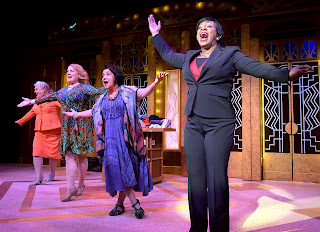Going without the flow: 'Menopause the Musical' finds fun in The Change
 |
| "Change of Life" writes the ticket for "Menopause The Musical." |
The show is opening Beef & Boards Dinner Theatre's 51st season, continuing through Feb. 4. The production requires the ultimate in change-of-life pizazz from its cast of four. When I saw the performance of Jan. 6 (putting aside the disturbing third-anniversary resonance of that date), it received that level of comic energy from Enga Davis, Melanie Souza, Nancy Slusser, and Kimberly Vanbiesbrouck.
Written by Jeanie Linders, "Menopause the Musical" follows a simple dramatic arc, from conflict through mutual understanding clearing the path to wisdom and a degree of personal triumph. Four women connect accidentally over a sale table at Bloomingdale's in New York, briefly tussling over a desired item. As the strangers calm down and open up to each other, they bond over familiar struggles such as mood swings, vision impairment, weight gain, hot flashes, and night sweats.
The four women are identified not by names, but by personal traits and habitual roles that carry into the dialogue and the songs they sing. Each adjusts to menopause after her own manner, with the Earth Mother (Souza) and the Soap Star (Vanbiesbrouck) applying their vanity to the challenge in distinctive ways.
The music, with prerecorded accompaniment, consists of parody versions of late-20th-century popular songs. One example provides the keynote address: "Chain of Fools" becomes "Change of Life," with Davis (as Professional Woman) singing Aretha Franklin's lead vocals with idiomatic backup by the others.
Harmony vocals in the other showcases were in good shape throughout, coordinated with movement under the direction of stage manager Kevin Casey. There were linked song borrowings in places where a certain menopause symptom was treated thematically: Beach Boys hits "California Girls" and "Help Me, Rhonda" became "Sane and Normal Girls" and "Help Me, Doctor" when the concern was psychological woes.
 |
| Menopause meet-cute: Bargain hunters pull on a black lace bra. |
To vary the rhythm, the show has a few cameo solos. When the Iowa Housewife (Slusser) exults with blithe tactlessness about visits to Indian and Chinese restaurants, the reminders of heat arouse hot-flash laments from her new friends. Soap Star's later version of the show's oldest song, Irving Berlin's "Heat Wave," was a real star turn, the best of the solos.
The perspective I got on the stage from the facility's new mezzanine (formerly the costume shop) allowed me to appreciate the variety of stage movement, including the women's exits and entrances through several stylish art-deco doors that were variously elevator or fitting-room doors. Offstage announcements marked changes of scene to indicate on which floor and in which department the women gathered in their shopping and bonding adventure.
Men are an afterthought for the most part, though the likelihood of their being disturbed by sleeping partners' mood swings and physical discomforts is directly expressed in a clever version of "The Lion Sleeps Tonight," with "husband" substituted for "lion" as he has to shift bedrooms.
I hope it's not taking the show too seriously to wonder about the final note of triumph that makes for the customary uplift that stage comedy requires. It turns out that when her new friends guide the Iowa Housewife to the joys of self-pleasuring (a change of shopping venue is strongly implied), it's symbolic of victory over menopause. No boys allowed.
The finale, with a coda involving shouted audience participation, is "YMCA" reconstituted as "Now Is Your Day." And to think it all comes with another Beach Boys parody as the vehicle: "Good Vibrations," naturally.
Up to that point, I guess, it's important to cover any lapses, not only of memory, with the self-serving assistance of being "The Great Pretender." After all, "What's Love Got to Do With It," as Davis belts it out, sporting a plausible Tina Turner stride and wig. A "New Attitude" can accomplish wonders, and the spirit of fun works out along with the body as the Change is suffered, then mastered.



Comments
Post a Comment